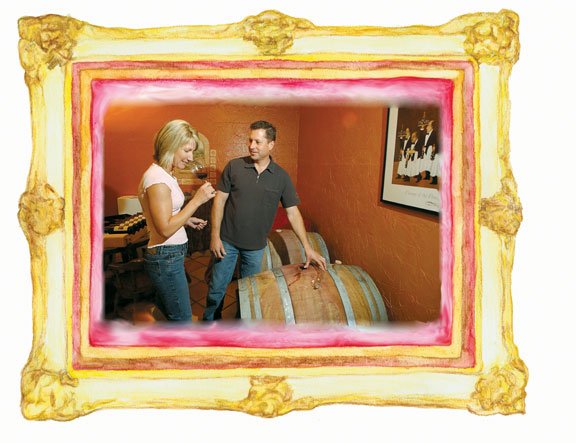Imagine looking for a new house and finding the perfect one:
It’s in the hills; it’s quiet; and it’s got a small plot of
grapevines.
After wondering what to do with the vineyard, it hits: Make
wine.
That’s what Mark and Heather Rotolo decided more than three
years ago when they moved into their house off Redwood Retreat
Road.
Imagine looking for a new house and finding the perfect one: It’s in the hills; it’s quiet; and it’s got a small plot of grapevines.
After wondering what to do with the vineyard, it hits: Make wine.
That’s what Mark and Heather Rotolo decided more than three years ago when they moved into their house off Redwood Retreat Road.
With the house came four acres of vines of carignan and mission grapes that are about 100 years old.
But the couple had never made wine before. Mark’s grandfather had produced wine for the family, but Mark didn’t have any experience.
So the Rotolos harvested their own grapes, and tried to sell them to local wineries.
That’s when they came across Thomas Kruse, owner of Kruse Winery on Hecker Pass. Kruse, a former hobby wine maker, parlayed his hobby into a career.
From Kruse, the Rotolos learned about the process of wine-making, from how to take care of the grapes to how to bottle the wine.
The Rotolos have since grown more experienced.
“It became a cool hobby,” Rotolo said.
Hobby wine making differs from what wineries do because hobby wine makers can’t sell their product directly to the public. That requires a permit from the state department of Alcohol Beverage Control.
“We could sell it, but only through Tom,” Rotolo said.
So the Rotolos bottle the wine themselves. Each year at harvest time, they have a pressing party where they bring in family and friends, have a barbecue and take turns picking and crushing the grapes.
Over the years, the Rotolos have learned how to perfect their wine, both from Kruse and from trial and error.
“Mildew is the biggest threat to the grapes,” Mark Rotolo said. “Two years ago, we lost almost 90 percent of our grapes.”
Since then, the Rotolos have taken the steps to protect their crops. Mark began spraying the crop with sulfur to head off the mildew, and now, to save time, the Rotolos have their crops sprayed.
But it’s a hobby that hasn’t been easy.
Rotolo says caring for the grapes is very labor intensive and time-consuming, and they even considered abandoning the hobby.
“The area is pretty, but it’s a lot of work,” said Mark Rotolo, whose day job is as a director for Redline Networks in Campbell. “People don’t realize how much work actually goes into caring for grapes.”
The Rotolos do all the wine-making work themselves, too, aging and bottling their wine at their home.
While making wine may seem like an expensive hobby, the biggest expense was the initial investment Heather Rotolo said. The couple at spent about $16,000 to get started, but the bulk of that was to pay for a tractor they had to buy. Without the tractor, their initial outlay was only about $1,000.
But all that work and the investment pays off. Using only the grapes they grow themselves, the Rotolos can produce up to 170 cases a year, depending on the yield of their vineyard.
When Kruse started out as a hobby wine maker in 1963, he bought 1,000 pounds of grapes to make his first wines.
He began the hobby after buying a wine press at an auction.
“It was just one of those whims,” Kruse said.
That whim also led Kruse to expand his hobby into a business in 1971.
Since then, Kruse has tried to help other hobbyists. For the past 25 years, he has taught wine-making courses at Gavilan College, and he also helps people who come to him for advice or assistance getting started.
In exchange for helping others with their wine making, Kruse takes a portion for himself.
The biggest piece of advice that Kruse says he can give to would-be wine makers is to understand the process takes time.
“You have got to be patient,” Kruse said. “Everything has it’s time.”
But in the end, the wine maker can enjoy the finished product.
“You can make a lot of new friends when you make your own wine,” Mark Rotolo laughed.













